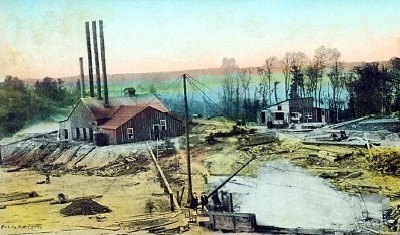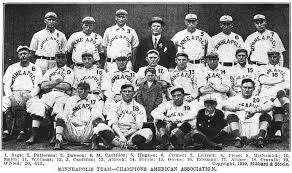
1903
“While surveying his land in the 1880s, Cuyler Adams noticed that the point of his compass was spinning. Over 20 years he explored the area for the underground metals that distracted his compass. He forms the Orelands Mining Company in 1903 and names the range by combining “Cuy” from Cuyler with “Una” after his pet St. Bernard.
The first ore is shipped from the Cuyuna Range in 1911. The 147,649-ton shipment to Duluth-Superior culminates years of searching, digging, flooding, and failing. More mines quickly open on the range, and immigrants from Finland, Italy, and Yugoslavia find themselves in new villages with names like Orelands, Klondike, Steelton, Ironton, Iron Hub, and Iron Mountain.” *
What a shock it must have been when Mr Adams’ compass needle started spinning! Did his hair stand on end? Did he calmly and rationally start thinking of possible explanations? Thank you Lord, that this wonderfully odd day in the life of Cuyler Adams was part of Your plan for Minnesota! Thank you for the curiosity You implanted in this man to explore; to seek and find! How many lives were changed by this single moment of the “spinning compass”?
This leads me almost instantly into feelings of remorse for my personal lack of intuition and imagination of Your possible purposes for such odd moments of my life. How many times have You placed me into a potential moment of discovery, and my response is to blame the defective spinning compass in my hands? My rational mind is often the killer of opportunity! I find myself in analysis paralysis, instead of simply continuing the process of looking for answers like Cuyler! Will You forgive this blockage to Your eureka moments?
This discovery acted as a catalyst for the movements of people and cultures from across the world to northern Minnesota. What was your purpose in this? Why is this ore important other than its obvious applications to industry? In any case, I thank You for using this valuable resource to facilitate the meetings and intermingling of peoples from Finnish, Italian, Yugoslavian, and Native Minnesotan cultures! You provide us with innumerable introductions to those of other cultures, and yet You do not force our hand in how we respond! You are the perfect travel agent!
I say thanks this day for the blessings and benefits of iron ore, and any of its other common metallurgical applications! Good Father, what a great medium You allow your people to play with?! What a useful material to bless past, present, and future generations!
Yet, as with any technology, it must be subject to self control. We used mountains of metal in World War I from this mine to assert our political will! We have beaten our plows into swords, and still we continue to do so! Will You forgive our defiant uses of natural resources? Will You help us learn to sidestep political manipulations into war? Will you forgive our resentment, hatred, and fear of others that germinates into the seeds of death? Will You mature our response to the spirits of accusation, provocation, and offense?
Will You also forgive our tragedies based on trust of our knowledge? We study and learn, which is good. But we often allow our knowledge to cloud our judgments! We do not retain a sense of scientific humility and curiosity. We often rely on our observations, and find that they are sadly based on a minuscule understanding of the natural world. For example,
“At the height of the mining, the Cuyuna Range was the location of the worst mining disaster in Minnesota, the Milford Mine disaster.[1] On February 5, 1924, a new tunnel was blasted too close to nearby Foley Lake, and water rushed in, killing 41 miners.” **
Will You forgive how we have hurt our fellow man, and Your world as a result of our miscalculations and arrogance? Lord have mercy! Will You remember our successes, our faithful and bold risks to grow and learn, and the ways we’ve sought to better the lives of others and ourselves?
* http://www.mnhs.org/about/dipity_timeline.htm
** http://en.wikipedia.org/wiki/Cuyuna_Range
*** A very readable resource on Cuyuna with brief bios by author Dean Klinkenberg.
http://mississippivalleytraveler.com/cuyuna-iron-range/
**** A wonderful read on Mr. Adams! https://ipeopleblog.wordpress.com/2012/12/12/1922-mining-engineer-cuyler-adams/









